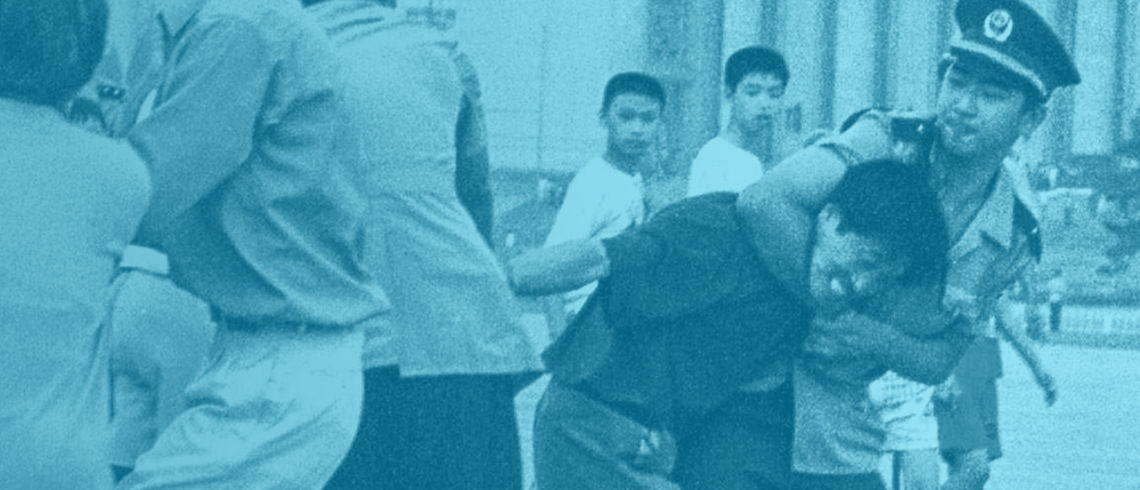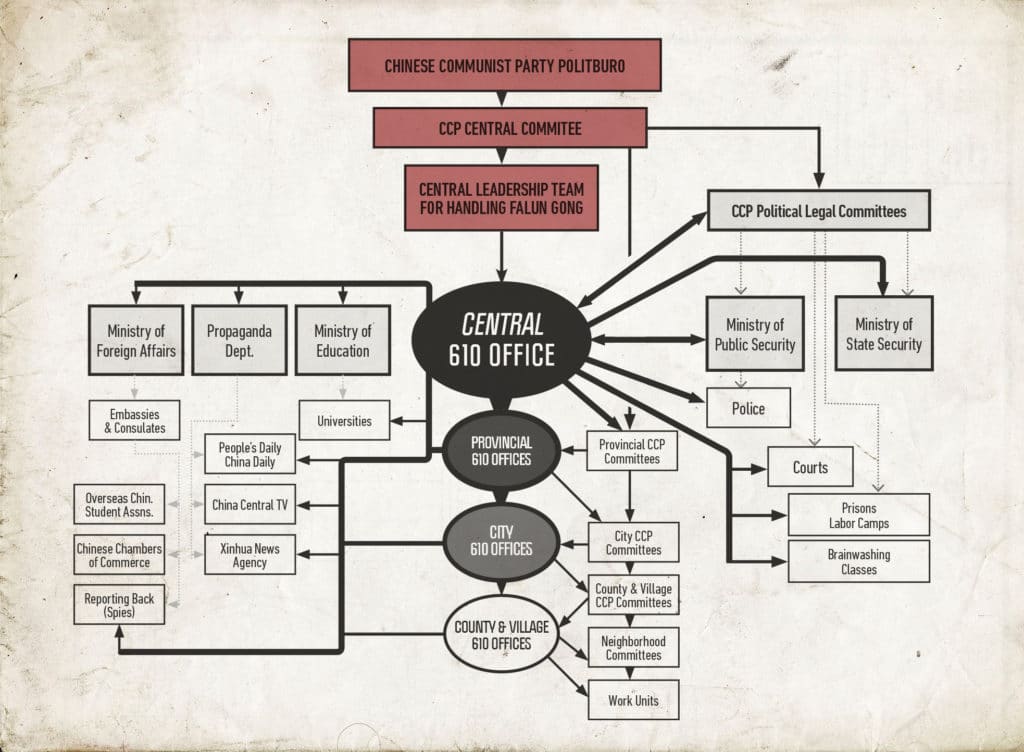
The 6-10 Office
The 6-10 Office—named after the date of its creation on June 10, 1999—is an extralegal police task force responsible for carrying out the mission of eliminating Falun Gong.
Established by former Communist Party leader Jiang Zemin and announced in a speech to elite cadres a month before Falun Gong was banned, the organization has long existed outside China’s legal framework.
Jiang granted it wide-ranging powers to use “every means necessary” to wipe out Falun Gong. Operating in an atmosphere of impunity even after Jiang was replaced by Hu Jintao, the 6-10 Office has become notorious for its regular use of extreme torture.
In his book A China More Just, human rights lawyer Gao Zhisheng describes being shocked by the extent of the 6-10’s operations.


“All CCP central departments, all ministries, all provinces, all cities must cooperate with the group very closely.”
“The immoral act that has shaken my soul most is the 6-10 Office and policeman’s regular practice of assaulting women’s genitals,” Gao wrote after his 2005 investigation. “Of those persecuted, almost every woman’s genitals and breasts and every man’s private parts have been sexually assaulted in a most vulgar fashion.”
In addition to torture and sexual abuse, 6-10 Office agents also administratively sentence the Falun Gong to labor camps and abduct adherents straight from their homes to brainwashing classes. As noted in a 2011 article on the 6-10 Office in the Jamestown Foundation’s China Brief, “transformation” and coercive thought reform are a central aspect of the agency’s activities. In addition to direct involvement in rights abuses, the 6-10 Office has possessed significant power to force the hands of other Party and government bodies.
“The 6-10 office is just like Hitler’s Gestapo,” says Guo Guoting, a Chinese human rights lawyer in exile. “They are powerful and they got enough financial support from the government so…they secretly control all the Falun Gong practitioners in their local areas.”

Though Party officials have externally denied the 6-10 Office’s existence, a broad range of public statements, internal documents, and testimonies refute such claims. Instead, available evidence paints a disturbing picture of a shadowy yet powerful Communist Party security force that has operated for over two decades like the mafia; an excessively violent organization that permeates Chinese society, but is well-known only to those who control it or work for it as well as, of course, those who dread it.
The 6-10 Office Today
As of mid-2020, the status of the 6-10 Office’s activities under that moniker have become somewhat unclear, although grassroots repression of Falun Gong practitioners continues apace throughout China. As part of the Communist Party’s infighting two high-ranking officials closely linked to the 6-10 Office—Zhou Yongkang, former Chinese security czar, and Li Dongsheng, who headed the 6-10 Office for four years—were purged in 2013-2015 and themselves sentenced to long prison terms on corruption charges. According to Freedom House, this resulted in “weaker leadership at the upper echelons” of the agency, leaving “more room for foot-dragging by local police who find the task of persecuting Falun Gong distasteful, or are concerned that they could later be punished for any abuses.”
In recent years, periodic reports have appeared of the 6-10 Office being dismantled due to ongoing Communist Party power struggles and internal restructuring rather than any human rights concerns. References to the agency on local government websites have decreased and it appears that its functions may have been absorbed by the party’s powerful Political and Legal Affairs Committee, which has long supervised it. Nevertheless, mentions do appear occasionally on government websites and Falun Gong victims of arbitrary detention and torture continue to refer to the involvement of 6-10 Office agents in ongoing abuses.
Meanwhile, the long-term legacy of the extralegal security force and its “transformation” tactics continue to influence the party’s security apparatus: China’s Minister of Justice Fu Zhenghua previously headed the 6-10 Office in 2015-2016. In his new role, he has reportedly been influential in orchestrating mass detentions and “transformation” efforts against Muslim minorities in China’s northwest Xinjiang region.
This is just one of many ways in which Jiang Zemin’s fateful decision to create the extralegal agency on June 10, 1999 forever changed the lives of millions of people and the trajectory of human rights, the rule of law, and religious freedom in China.
To read more on the 6-10 Office:
- “The Gestapo-like ‘610 Office’,” Falun Dafa Information Center
- “The 610 Office: Policing the Chinese Spirit”, Jamestown Foundation China Brief
- “China’s Gestapo Marks a Decade”, Falun Dafa Information Center
- “In His Own Words”, a former 6-10 Office agent who defected speaks out, The Epoch Times
- “Falun Gong,” The Battle for China’s Spirit, Freedom House


